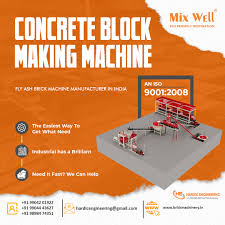
Concrete Block Plant
A Concrete Block Plant is an industrial setup dedicated to the large-scale production of various types of concrete blocks including solid blocks, hollow blocks, paving blocks, and interlocking blocks. It consists of multiple machines and equipment working in sync—ranging from mixers and conveyors to block-making machines and curing systems. These plants offer fully or semi-automated solutions for the production of construction-grade blocks with precision and consistency.
Raw Material Preparation
Cement, fly ash, stone dust, sand, and aggregates are sourced and stored in silos or bunkers.
Concrete Batching and Mixing
An automatic batching plant weighs materials and sends them to the mixer where water and additives are added for proper consistency.
Feeding System
The prepared concrete mix is transported to the block-making machine using a conveyor or skip hoist.
Block Molding Process
The block-making machine compresses the mix in heavy-duty molds using hydraulic pressure and high-frequency vibration.
Curing Process
Freshly made blocks are transported on pallets to a curing area where they undergo steam or water curing for strength development.
Stacking and Storage
After curing, blocks are automatically de-palleted, stacked, and stored or packed for dispatch.
Industrial and residential building projects
Government and smart city infrastructure
Road construction and urban development
Low-cost housing programs
Real estate and township developments
Precast construction material supply
Landscaping and pavement work
Brick replacement solutions
Cement product distribution businesses
Fully or semi-automatic control systems
Multi-cavity mold setup for different block sizes
Inbuilt batching and mixing system
Pallet stacker and block de-stacker
Hydraulic pressing system for dense blocks
Vibration system for smooth surface finish
Mold change option within 15–30 minutes
Built-in curing racks or chambers
Centralized PLC/HMI control system
Concrete block plants offer a systematic, high-efficiency solution for producing superior-quality blocks that are used in nearly all types of modern construction. They reduce the time and cost of manual block making and ensure reliable supply for growing infrastructure needs.
Mass Production: Capable of fulfilling large construction orders
Labor Efficiency: Reduced manpower needed due to automation
Eco-Friendly: Enables the use of fly ash, GGBS, or recycled materials
Precision: Uniform and dimensionally accurate block production
Versatility: Produce solid, hollow, interlocking, and paver blocks
Cost-Efficient: Reduced per-unit production cost
Time-Saving: Quicker setup and curing cycles
Durability: Machines built for 10+ years of operation
Automation Ready: Expandable with conveyors, packers, etc.
Scalable: Suitable for small to industrial-scale operations
A Concrete Block Plant is the backbone of the construction material supply chain. It ensures a consistent flow of quality blocks, supports sustainable construction, and offers high returns on investment. Its significance lies in its ability to transform basic materials into premium-grade building blocks, supporting both urban and rural development.
Helps meet rising construction demands
Long-term cost savings vs manual production
Adds value through customization of block designs
On-site or near-site production options
Export potential for ready-made blocks
Improves your brand credibility in construction supply
Easy maintenance and operator training
Reduces material wastage
Quick ROI due to bulk output
What materials are used in a concrete block plant?
Cement, fly ash, sand, aggregates, and water.
How much area is required to set up a plant?
Typically 5,000–15,000 sq.ft depending on automation level.
Is the curing process automated?
Yes, steam and water curing systems can be automated.
Can the plant produce colored paver blocks?
Yes, with an additional surface color feeder unit.
Is customization of block size possible?
Yes, using interchangeable mold sets.
What’s the power consumption?
Ranges between 15 HP and 50 HP depending on size and output.
Are these plants suitable for outdoor installation?
Yes, with weather-resistant components and sheds.
What is the production rate?
Varies between 5,000 and 50,000+ blocks per day.
How many operators are required?
3–8 operators depending on automation level.
Can it be integrated with packaging lines?
Yes, automated stacking, counting, and palletizing systems are available.
A Concrete Block Plant is an essential asset for modern construction supply businesses, builders, and precast manufacturers. It boosts production speed, ensures consistent quality, and significantly cuts down the labor and cost involved in conventional methods. Whether for local demand or international export, a well-designed block plant ensures stronger blocks, faster construction, and bigger profits.
Contact:-+91 99042 01922 / 9898474351
Office Address
C-1, 77/1, Kaka Estate, Ambicanagar Road, Nr. National Plastic, Odhav, Ahmedabad – 382415, Gujarat, India.
Factroy Address
24, Shreeji Estate Near Sankalp Estate, Bakrol Cir, Ahmedabad-382430, Gujarat, India
mixwellindia@gmail.com
hardicengineering@gmail.com
+91 99042 01922
+91 98984 74351
Also Send Mail
© Hardic Engineering . All Rights Reserved.
